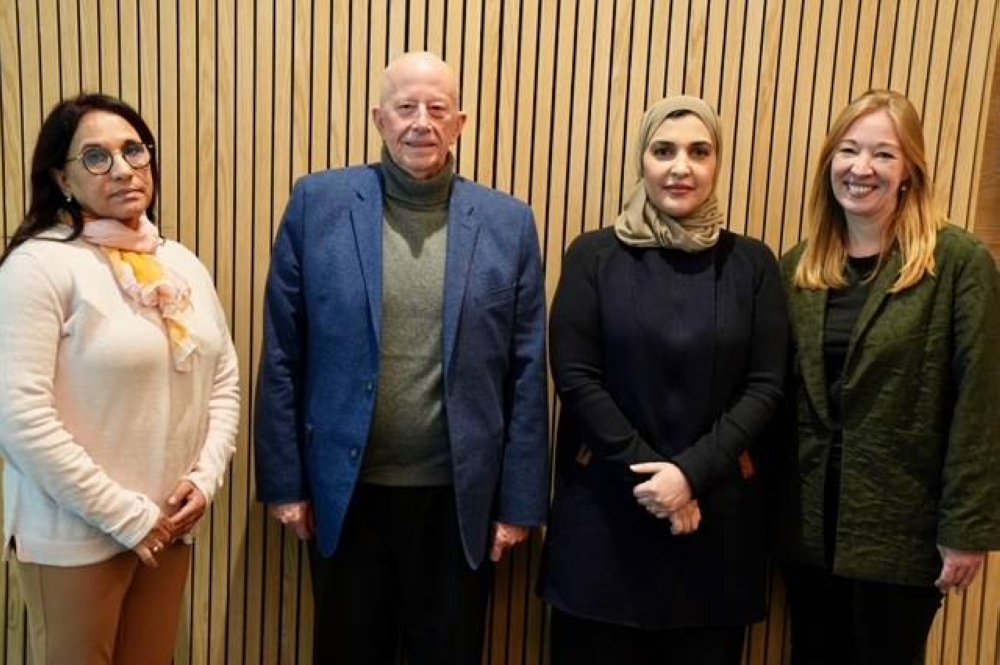Chairperson of the Global Alliance of National Human Rights Institutions (GANHRI) and the National Human Rights Committee (NHRC) HE Maryam bint Abdullah al-Attiyah conducted a preparatory meeting with the global alliance team for the 14th International Conference of National Human Rights Institutions under the title of Torture and other ill-treatment: the role of national human rights institutions (NHRIs), organised by the GANHRI in the Danish capital, Copenhagen on November 6-8.
The meeting was attended by GANHRI Secretary-General Amina Bouayach and the chairpersons of the GANHRI regional networks: Africa Chairperson Joseph Whittal, Americas Chairperson Pedro Francisco Callisaya Aro, Asia-Pacific Chairperson Doo-Hwan Song, and Europe Chairperson Sirpa Rautio.
Al-Attiyah held a separate meeting with the Chairperson of the UN Committee against Torture Claude Heller.
Discussing the upcoming conference, al-Attiyah said that it will address “Torture and other ill-treatment” in a holistic manner, serving as an important opportunity for the NHRIs to build on their previous achievements, and to work together with partners and stakeholders to exchange expertise, identify best practices, and reaffirm the importance of their individual and collective commitment to the right of all persons to be free from torture and other forms of ill-treatment under international law.
She added that torture and other forms of cruel, inhuman, and degrading treatment and punishments are totally prohibited and can neither be justified nor tolerated, constituting one of the few crimes prohibited globally.
Al-Attiyah explained that despite the global prohibition, torture still exists in all regions of the world, with empirical research showing that the right to bodily integrity is still the most violated right in the last quarter of the 20th century, so much so that torture and other ill-treatment are sometimes employed as an ordinary governance tool.
She pointed out that the prohibition is not adequately complied with in practice due to a lack of understanding of the legal definitions of torture and other ill-treatment.
The official said that the work of NHRIs is especially crucial for those people and groups who are at greater risk of discrimination, violence, and other forms of human rights violations and abuses.
Al-Attiyah highlighted that the conference’s general objective is to explore the role of NHRIs and national mechanisms in combatting and preventing torture and other ill-treatment in their jurisdictions, in addition to fostering co-operation regionally and internationally, to identify all practical and effective ways for NHRIs to employ its broad mandates and various functions under the Paris Principles, in order to uphold the rights of all persons to human dignity and freedom from torture and other ill-treatment.
She indicated that the conference also aims to increase understanding of the challenges faced in combatting and preventing torture and other ill-treatment in practice, and their root causes, in addition to discussing the role of NHRIs and national preventive mechanisms in reducing and eliminating torture and ill-treatment, especially with regard to practical legislative and procedural frameworks and strategic practices.
Al-Attiyah also noted that the conference’s closing remarks will serve as a road map for individual and collective efforts and NHRI strategies on combating torture and other ill-treatment.
She said that she looks forward to the presentations and to learn about the priorities, challenges, and needs of each of the four regions in the GANHRI network.
The official highlighted that the conference will see the participation of Vladlen Stefanov from the Office of the High Commissioner for Human Rights, and Sarah Rattray from the UN Development Programme.
Al-Attiyah emphasised that co-operation and partnerships are key to gather more support for NHRIs globally.
During her meeting with Heller, al-Attiyah said that human rights treaty bodies, including that of the “Torture Convention”, ensure the implementation of human rights treaties on the ground now and at all times of conflict.
She added that NHRIs identify and highlight issues, the UN treaties and bodies play an essential role in supporting and enhancing the work of NHRIs, while GANHRI engages with treaty bodies to strengthen this unique relationship, all in the aim of supporting the implementation of human rights on the ground.
Al-Attiyah said that the conference’s recommendations will provide new impetus for co-operation and the strengthening of ties, including bettering NHRIs’ understanding of the work of the UN Committee Against Torture.
The meeting also discussed the possibility of hosting joint events to exchange views and co-ordinate on the recommendations of the GANHRI’s Sub-Committee on Accreditation.

